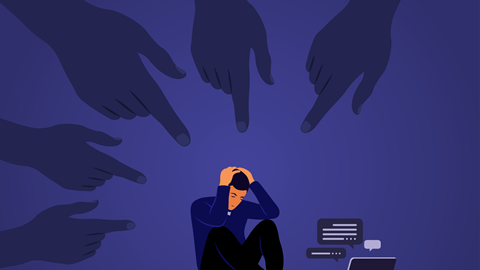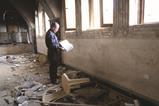As one church leader reports being afraid to open their emails in anticipation of the abuse they’re likely to receive, Heather Tomlinson investigates the claim that pastors - not congregants - are the most common victims of spiritual abuse
The stream of allegations of abuse against pastors such as John Smyth, Mike Pilavachi, Alan Scott and many others has been so appalling in recent times that many leaders have sought out training to ensure they safeguard themselves from becoming the next scandal-hit church.
But for one evangelical leader, this good intention led to revelations of a very different kind.
“The lightbulb moment was when I went to a spiritual abuse training day,” he told Premier Christianity. “I felt that I needed to be able to identify those who were victims [of abuse from previous churches]. I also wanted to check that I was behaving, speaking and acting appropriately myself.”
As might be expected, the morning was spent listening to harrowing, painful stories of victims abused by pastors. “But what surprised me was what was taught next: the spiritual abuse of church leaders,” he continued.
“They went through the kind of things that church leaders are subjected to. As they spoke, it was like a weight just lifted off my shoulders. I thought: Oh my goodness, it’s not just me. This is a real thing that I’ve experienced, and many of my colleagues have experienced.
“When I started to write down the things that have happened to me: the shouting, the physical abuse, the emails, the WhatsApp messages, the accusations, the judgement, I thought: This isn’t OK.
Other pastors – and those who support church leaders – also told Premier Christianity of negative experiences that could be classified as verbal, physical and spiritual abuse. Some are subtle, some are obvious.
There was a point where I would be afraid to open up my emails, because I thought: There’s going to be something nasty there
Many believe that this is not an unusual problem. “It is right to highlight the abuse perpetrated by pastors – and there have been some horrendous examples in recent years”, said one senior source within a denomination. “But I would say the opposite is far, far more common.”
In 2018, church safeguarding charity thirtyone:eight undertook a research project into spiritual abuse in Christian communities in conjunction with Bournemouth University. A less noticed comment on the research was: “Leaders can and do experience spiritual abuse from those they are leading, and this experience needs to be recognised and responded to.”
Justin Humphreys, chief executive of thirtyone:eight told Premier Christianity that it’s not possible to say how common this is due to a lack of research. “There is more work to do,” he said. Yet when the roles are reversed and a pastor treats a member of their church badly, it makes newspaper headlines. Could it be possible that we take one very seriously, and not the other?
For example, Humphreys points out that “just about everything we see from a leader to a congregation that we would define as spiritual abuse can also be [experienced] in reverse”. This includes misusing the Bible or Christian teaching to denigrate, coerce or control church leaders – threatening dire spiritual consequences if the pastor does not fall in line with their wishes.
US church leader Phillip Manginelli from Square Church in Georgia also recently raised the problem on the ‘Pastors Podcast’: “Pastors are the most spiritually abused people I’ve ever met,” Manginelli said. “I get used, mistreated, gaslighted – like, all the things that people say. I’m not minimising real spiritual abuse, it’s horrible. I’m just saying the normal little things, you want to know who deals with those things more than anyone else? Pastors.
Frequent criticism
Even pastors who have experienced physical assault said they often find constant criticism more difficult. “There was a point where I would be afraid to open up my emails, because I thought: There’s going to be something nasty there,” said our ‘lightbulb’ pastor. “I would take a breath and pray, waiting for the one with the sting in the tail…such as the women who said: ‘I’m not growing in the Christian faith and it’s your fault.’ That’s like a small atomic bomb going off in your soul, because you live for helping them grow in faith.”
He was recently faced with another email accusing him of 20 personal faults. Upon meeting the person, he was faced with a “tirade”, he said. “That shook me. You lose your confidence, your peace, your joy, for days actually.”
Some complaints are personal – but more often it’s over apparently trivial issues: “It is so wearing, the constant criticism…any major decision you make, there is somebody who will voice opposition to it.”
I think it’s got worse because of the advent of technology
Many pastors think dealing with criticism is just part of the job. But it can take a serious toll. “This is the obvious and invisible way that leaders get abused,” said one pastor of pastors. “Let’s take a church with 200 people,” he said. “If everyone complains to the minister twice a year, that’s 400 complaints a year. That’s eight a week.”
Another pastor made a phone call to someone whose wife was ill to ask how she was and listened to an hour-long “litany” of complaints, from having a rota for musicians and using too many new songs, to using historical context in a sermon. “For weeks afterwards I would keep talking to my wife about the things he had mentioned…it was made worse by the fact that I’d made the phone call on my birthday.”
Unreasonable and/or unclear expectations
When US pastor Thom Rainer asked his church deacons to clarify the minimum time they expected him to spend on preaching, sermon prep, evangelism, hospital visits etc, the results were startling: to satisfy their requirements, he would have to work 114 hours each week. “No pastor can humanly meet the varied and often conflicting expectations of every church member,” he writes on churchanswers.com, a US ministry he created to support pastors.
“There are some people who assume leaders will sacrifice family to make church work, and if you are not prepared to, you’re not worthy of the job,” said one counsellor to church pastors. “It is not conducive to the flourishing of the leader and their family…It’s the reason a lot of pastor’s kids end up hating churches.”
It can be too easily forgotten that many pastors are considered employees and so have legal rights to clear job descriptions, limited hours and a structured process to deal with problems.
Verbal abuse and harassment
Church leaders report abusive language and shouting from congregants. And especially for pastors who wear visible clerical clothing and have parish responsibilities to the general public, they can be on the receiving end of all and any resentments a person might have towards the wider Church, too.
One recalled a man coming to his home and shouting at him in front of his family: “To frighten my wife and children, that’s a different kind of abuse. His sister had died of cancer…He was cross with God, and because I was God’s representative, he was very angry, shouting, spittle on my face.”
Pastors are the most spiritually abused people I’ve ever met
In a proposal to General Synod to introduce a code of conduct for parochial church council (PCC) members, Chelmsford Diocese cited examples of “slamming fists on tables and continually interrupting when others speak”, “emailing repeatedly, and when blocked on email, printing and delivering copies of a message”. It pointed out that even if police intervened, a PCC member could still not be removed: “current rules force the churchwarden to meet their harasser on a regular basis”. The Church of England is still developing proposals to prevent this.
Physical and sexual abuse
Although unusual, some pastors have experienced physical assault or threats, as well as sexually inappropriate behaviour. For example, demanding the pastor make a home visit alone (bypassing established boundaries that prevent abuse) or even being offered a bath.
Obviously, any of the above types of behaviour can cause significant harm to a church leader, especially when experienced over long periods of time. It is also a major cause of burnout. “There can be a barb that gets into your heart,” said one. “It takes time to heal. It is literally spiritual warfare.”
‘My fear is a pastor will take their own life’
After being in ministry for nearly 40 years, Dave Burke now mentors church leaders. He is concerned that well-meaning attempts to identify and prevent spiritual abuse have led to unfair and even harmful treatment of some in ministry. He shares his experiences
I have worked with six people where guilt has been assumed and innocence had to be proved. They were told not to talk to anyone – and others told not to talk to them.
In one example, a pastor’s wife was blunt, and it was taken as offensive and bullying language by some, even though it was in her own home. Are we saying only a certain kind of person can minister? If they are blunt or express things forcefully, do they no longer have a future?
When people use expressions like bullying and gaslighting, do we have a clear definition of what that is? The vocabulary around abuse and manipulation is often so vague that people can weaponise it in a wide variety of ways. My big concern is that it quickly becomes an unanswerable accusation. There has to be a more just and fair way to deal with this kind of thing.
During my time in ministry, the most difficult thing was people who didn’t feel you were the right person for the job, or folks who felt the church was not functioning well and would be careless in how they said that. As a pastor, you have to be big enough to absorb that – it’s what Paul talked about, carrying the sufferings of Christ.
However, we get into ministry because we love the church, the people in it, and are passionate about the gospel. That means we’re very abusable, because we’re so committed to this, we don’t want to damage it, we don’t want to rock the boat. My fear is that somebody is going to sue a church over their behaviour towards them. Or worse, a pastor will take their own life if their community is taken away from them [following an accusation]. The church will look phenomenally bad.
A difficult problem to solve
There isn’t always an obvious way to put boundaries in place to prevent subtle kinds of abuse. And even when a lay person’s behaviour breaks the law, pastors can be reluctant to take action. “You don’t go to the police, you don’t want that person to be harmed or charged,” said a pastor who has experienced assault. “All the time I remind myself: There is a reason [for] them behaving in the manner they are behaving.”
Public services today are replete with notices warning that aggressive behaviour will not be tolerated: one source mused whether this might be necessary for churches, too.
Church discipline is almost impossible these days without being accused of being an abusive bully
The misuse of the term ‘spiritual abuse’ could also be causing problems in carrying out church discipline. When confronting sinful behaviour such as adultery, some leaders have been met with accusations of spiritual abuse, for example. “There was a time when you heard strong preaching and the minister would tell you what to do,” said one source. “You can’t do that anymore. [Pastors] are afraid of preaching the gospel because they might be accused of bullying.”
This can be particularly challenging when congregation members have different theological stances to the pastor. Some people of a liberal persuasion might label all firm moral teaching on sexuality as abusive.
In a denomination such as the CofE, where those who hold a leader to account – such as bishops or safeguarding staff – might have very different theological beliefs, this can become especially complex. “This is a real minefield now pastorally,” said one pastor. “I know some church leaders feel tongue-tied, reluctant to bring any kind of directive preaching or counselling. If church leaders don’t feel they can bring biblical preaching, where are we heading?”
“Church discipline is almost impossible these days without being accused of being an abusive bully,” said another. “When you get those sorts of terms used, the person who has been put under discipline can walk away and go to another church, but allegations stick on clergy.”
In smaller churches, the pastor might not be the person who holds the most power. If their wage and house are provided by the church, and lay members have enough influence, the pastor could be the more vulnerable party. “Where there is a sole minister without a supportive eldership, those people are extremely vulnerable to the most vehement people in the congregation,” said one insider. “The real power might be somewhere else entirely…yet the powerful person in the congregation who is pulling the strings is completely unaccountable.”
Questions to reflect on before sending a critical email to a pastor
- Is it better to say this in person?
- Does this need to go to the pastor, or to someone else?
- Can I start the email by saying something encouraging?
- Would I say this differently in front of others?
- If there is a dispute (and not a serious complaint), as well as applying Matthew 18:15-17, am I applying Jesus’ teaching on the mote and beam (Matthew 7:3-5)?
- Am I trying to control something that is not mine to control?
- Is what I’m saying constructive?
- Can I sleep on it before sending it?
Is it getting more difficult to be a pastor?
Many pastors say these problems are getting worse. “I wonder if it has just become a cultural norm in many of our churches that you can say what you like to a church leader,” said one pastor. “A friend of mine recently said: ‘You’ve become the punchbag.’
“It was worse in lockdown. Whatever decision I made, I would get abuse. I would get emails, raised voices, pointed fingers. I can remember being accused in Waitrose of not having faith, not trusting God, Covid was not real, I was preventing people from worshipping God. I thought: This is not OK.”
“I think it’s got worse because of the advent of technology,” said one pastor. “You used to write a letter and it took a bit longer, now you can just send an email or Whatsapp with no real thought of the impact.”
But a deeper reason may be a wider cultural shift that finds many people deeply suspicious of authority, keen to highlight wrongdoing, and not afraid to express their judgements.
No pastor can meet the varied and conflicting expectations of every church member
“People give vent to their own feelings so much more freely,” said another pastor. “There isn’t the same sense of etiquette, of politeness, to prevent them giving power to their views. My wife said: ‘When I was a child, you would never speak to the pastor the way people speak to you.’”
“Maybe there has been a change in the dynamic about authority,” mused one Anglican. “General Synod’s respect for bishops has massively declined. A congregation’s respect for clergy has declined. In a settled Christendom, you respect the vicar. As we move further away from that…people have lost the automatic respect.”
There’s obviously a balance between holding leaders to account and also respecting them. But just because a pastor has a level of authority, it shouldn’t make them the enemy. A culture that blindly ‘honours’ leaders has been shown to lead to appalling abuses. But the congregation are just as capable of appalling abuse as any leader – and should not be allowed to cause misery unchecked, either.
Changes in the Church of England
Two proposals were presented to the Church of England’s General Synod in 2024 that acknowledge the problem of unacceptable behaviour from lay members in local parishes.
General Synod voted in favour of a proposal from the Diocese of Chelmsford to introduce a code of conduct for PCC members and lay volunteers. They also voted in favour of a motion brought by Ven Mark Ireland, then-archdeacon of Blackburn, to allow lay officers found guilty of bullying to be disqualified from holding office. Ireland told Synod that he has been “inundated with stories from victims and survivors, stories which have moved me sometimes close to tears”. He highlighted one priest’s experience: “Right from the off there was continual criticism of my approach to worship and mission, ‘We don’t do it like that here’, and I was publicly ‘told off’ for a new approach I had taken.”
Ireland also included another’s priest’s recollections: “Decisions agreed by the team were reversed after meetings without any reference to me. The bully would only work with a certain group of like-minded people. People I had encouraged to take part were dismissed and replaced.”
In the CofE, processes exist by which vicars can be held to account, including the Clergy Discipline Measure (CDM). But “there remains no proportionate and accessible means by which laity can be held to account for their actions,” noted Ireland’s proposal. This led to an “imbalance of accountability in relationships”, it said.
In fact, the CDM process is currently being reformed and renamed. But not before it has caused a lot of difficulty, especially when used for minor matters that could be labelled “vexatious complaints”. For example, Synod lay chair, Amanda Robbie, explained how her husband still suffered from health issues due to the stress from dealing with inappropriate use of the CDM.
The Church Times also reported that Synod member Rebecca Hunt told the February Synod: “her colleagues at the Christian Legal Centre had defended several clergy who had faced abusive proceedings under the CDM, in which the issue had actually been a pastoral breakdown or theological differences. Many were left traumatised and stressed by the experience.” Hunt welcomed the reforms, said Church Times, particularly praising the new grievance track, designed “to keep more minor matters out of tribunals, referring to one case of a vicar who was the subject of a CDM complaint for not visiting a parishioner in hospital.”






































No comments yet